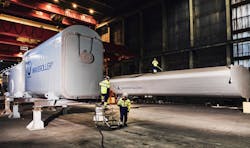AW-Energy, Kaoko Green Energy Solutions ink wave energy MoU
Offshore staff
FINLAND — AW-Energy, a provider of near-shore wave energy technology, signed a memorandum of understanding (MoU) May 3 with Kaoko Green Energy Solutions (Pty) Ltd. in Namibia.
The MoU is devoted to the development of renewable energy and aims to produce green hydrogen from renewable energy sources including wave energy. It is an initiative that supports a mutual intention to co-operate and explore knowledge share opportunities for the development of clean and sustainable ocean energy resource and the assessment phase of wave farm developments in Namibia.
The project will be operated in three phases:
- Phase 1 will include a detailed site design and cover the fabrication and deployment of a WaveRoller wave farm on the coast of Swakopmund, Namibia, to deliver renewable power to support in-land resettlement and development;
- Phase 2 will assess the capacity for wavefarms in several locations in Namibia; and
- Phase 3 will expand wave energy plants to deliver power to the grid and help in new ways to provide energy for desalination and green hydrogen projects.
Sacky Nalusha, a director with Kaoko Green Energy Solutions, said, “It is an open secret that the energy sector in the Southern Africa is currently underdeveloped, creating opportunities for innovative solutions and partnerships that can grow the sector. The current energy shortages in the region have paved ways to explore alternative, untapped and sustainable energy sources. Ocean waves have the potential to provide a sustainable solution to our energy needs and demands.”
Namibia’s Green Hydrogen Council launched its green hydrogen strategy at COP27 in Sharm El-Sheikh, which supports the country’s commitment to the Paris Agreement on climate change, with the ultimate goal of reducing emissions to net zero by 2050. The strategy will also allow Namibia to become a net exporter of energy by unlocking its potential to meet global demands of 10 million metric tons by 2030 while playing a pivotal role in energy security for the region.

